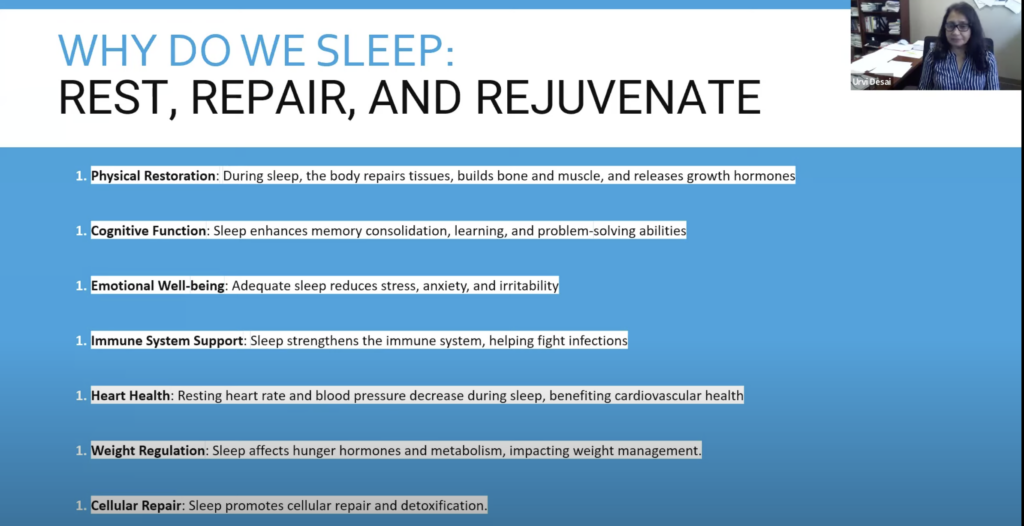Dr. Urvi Desai, a board-certified neurologist and certified sleep medicine specialist, participated in a recent MGFA webinar to discuss how MG can impact sleep and he presented best practices for addressing sleep disorders.
First, Dr. Desai shared why sleep is important. When we sleep, our body repairs tissues, builds bone and muscle, and releases growth hormones. Sleep enhances memory and thinking abilities, helping us focus and learn better when we are awake. Sleep helps us regulate our emotions, supports our immune system, and helps with metabolism and weight regulation.
If your sleep is disrupted, it can have negative implications for your physical and mental health.

How do you know if you are having any sleep problems? Dr. Desai recommends you ask yourself the following questions:
- Do I have difficulty falling asleep?
- Do I have difficulty sleeping through the night?
- Do I wake up with dry mouth or sweats?
- Has anyone ever noticed that I snore loudly or stop breathing in my sleep?
- Do I move around a lot in sleep or kick my legs?
- Do I act out my dreams?
- Do I find myself falling asleep during the day, especially at inappropriate times, like while driving?
- Do I feel refreshed when I wake up or still groggy/tired/headachy?
- Do I have trouble concentrating, paying attention, or remembering things during the day?
Answering “yes” to any of these questions may indicate a sleep problem. While not all sleep problems require intervention, not getting enough quality sleep can impact your health. It’s important to notice how you feel and whether a sleep disorder might be at play.
Dr. Desai described two sleep disorders that are common for those with MG (although studies on sleep disorders and MG are limited).
Obstructive sleep apnea is common in the general population, and people with MG may be more at risk of developing this disorder. Almost a quarter of MG patients in one 2017 study had sleep apnea.
Obstructive sleep apnea is caused by the tongue blocking your throat, momentarily cutting off your breathing. As a result, you may wake multiple times per hour throughout the night, severely disrupting your sleep.
The bulbar weakness that’s common in MG can lead to sleep apnea, while steroids and other medications that cause weight gain can make it more likely you’ll develop sleep apnea.
In the webinar, Dr. Desai reviews how to get an apnea diagnosis as well as different treatments that you can try.
Insomnia is also common among MG patients, with one study indicating that almost half of people with MG experience this sleep disturbance. Insomnia risk factors for people with myasthenia gravis include the severity of your disease, whether you are in crisis, feeling anxious about shortness of breath or about your disease more generally, depression, and increased age. Those on corticosteroids can also experience insomnia as a side effect of the medication.
Dr. Desai cautioned that some treatments for insomnia are contra-indicated for people with MG, so be mindful before you start any medication for insomnia.
Finally, Dr. Desai shared some data that indicated that people with MG are twice as likely as the general population to have restless leg syndrome, which can have a tremendous impact on sleep quality. She shared more about how to address this problem.
Watch the full webinar for more advice on getting a good night’s rest.

